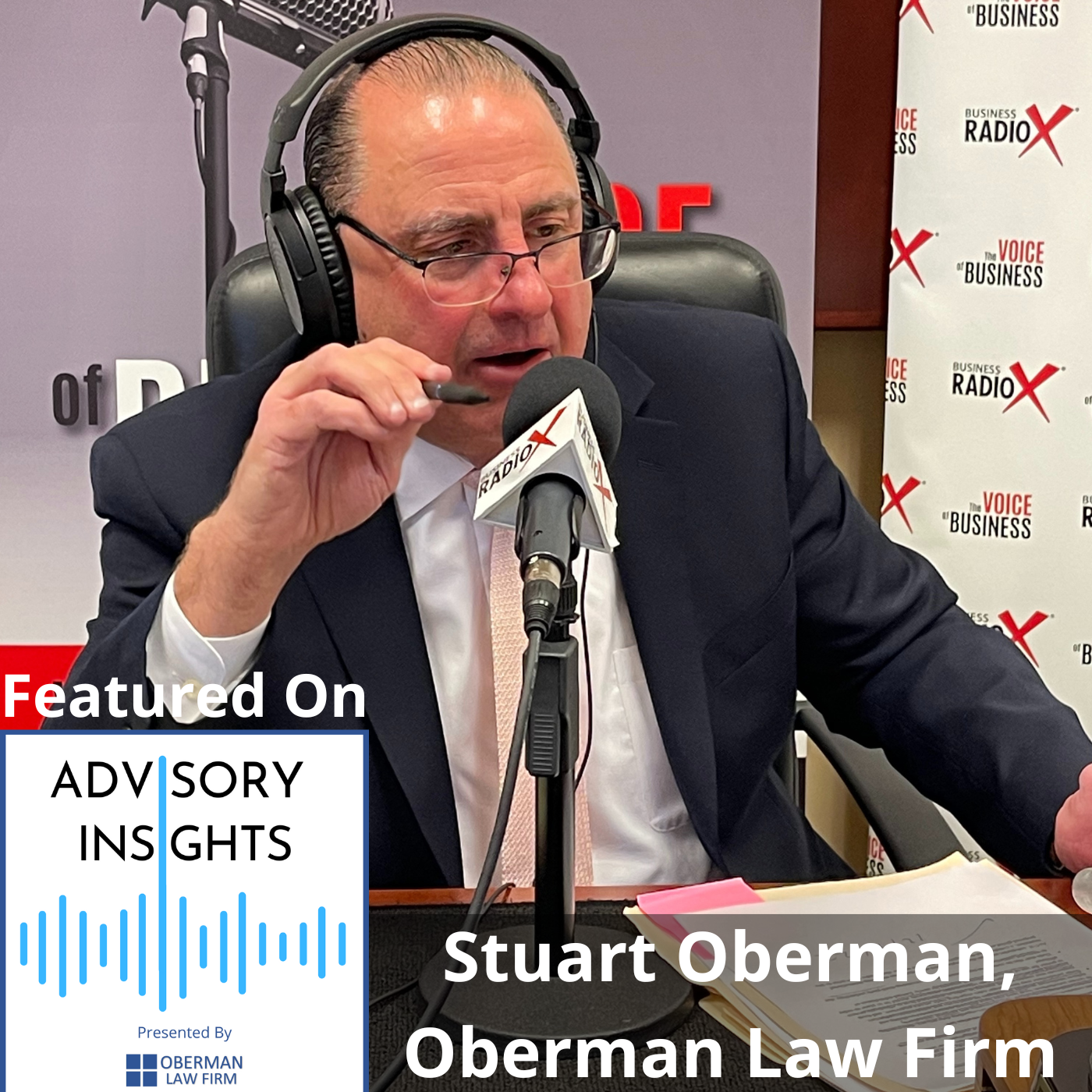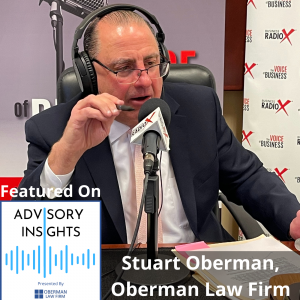
HR Hot Buttons for 2023 (Advisory Insights Podcast, Episode 25)
On this episode of Advisory Insights, Stuart Oberman of Oberman Law Firm discussed some of the key HR issues that businesses will need to be aware of in 2023. He covers topics such as layoffs, severance packages, onboarding, and employee policies, and stresses the importance of being prepared for these potential problems in order to avoid any legal or financial difficulties down the road.
Advisory Insights is presented by Oberman Law Firm and produced by the North Fulton studio of Business RadioX®. The series can be found on all the major podcast apps. You can find the complete show archive here.
TRANSCRIPT
Intro: [00:00:01] Broadcasting from the studios of Business RadioX, it’s time for Advisory Insights. Brought to you by Oberman Law Firm, serving clients nationwide with tailored service and exceptional results. Now, here’s your host.
Stuart Oberman: [00:00:20] Hello everyone, and welcome to Advisory Insights. Stuart Oberman here. All right, folks, we’re going to keep drilling it down. I want to cover today, HR Hot Topics for 2023. We’re going to talk about it. We’re going to talk about it. We’re going to talk about it, because I know what’s going to happen is it’s going to be 2025 and the people that listen to this podcast are not going to do what I tell them to do. And we’ll be saying the same thing for 2025. So, we’re going to keep drilling this down until our guys get it 100 percent.
Stuart Oberman: [00:00:51] All right. Look, I’ll take a look at Hot Buttons here. Number one, employee benefits. You’ve got to look at the packages. In today’s market, the packages are competitive. I want you to look at what your health benefits are. I want to look at whether or not you need to do a 25 percent gross up to cover salaries for budgetary purposes. What are your benefits? Where do you need to cut? By some accounts, we are either in a recession or going into a recession, but it’s still a tight labor market. Do we need to make adjustments, plus or minus, on these packages?
Stuart Oberman: [00:01:29] Employee handbooks review. I’m going to tell you right now, I want everyone to review their handbooks every year because your people change, your culture changes, your company values change, which I hope go up. And then, what are the needs of your business? You know, goodness gracious, the needs of 2019 in COVID were a lot different than they are today. So, take a look at where you’re at business-wise. Are you expanding globally? Are you expanding in states?
Stuart Oberman: [00:01:56] In our previous podcast, we talked about different localities. We talked about different laws that affect pay equity. Are you up to date on those things? Now, folks, this is either going to be into bonus season or first quarter next year is going to be bonus season, deferred profit sharing. You have to look at what your numbers are. Are you looking at plus bonuses, minus bonuses, no bonuses? Are you looking at retirement plans? You have to look at your bonuses and deferred comp for your profit sharing.
Stuart Oberman: [00:02:28] I would urge all of our listeners, take a look at what your CPA has told you through the year. As for deferred profit sharing, are you going to declare all your income in 2022? You’re going to roll it over to 2023? Of course, I didn’t say that. So, you’ll just have to have that between your conscience and your CPA. I’m not getting into that one.
Stuart Oberman: [00:02:51] So then, we want to take a look at, I want compensation structures, number four. It is an absolute turbulent market right now for pay structures. It is all over the map. You’ve got talent that’s facing layoffs, but yet you still got a tight labor market because a lot of our employers can’t find qualified people. You’ve got pay transparency laws to look at affecting the states. You’ve got internal equity and market positions that need to be analyzed on either a quarterly, at least every six months to make sure everything is understood, perceived – and I’m going to use the buzzword of today – equitable. If you can define equitable in less than 97 paragraphs, you’re doing better than I am.
Stuart Oberman: [00:03:41] Let’s take a look at number five. I want to take a look at merit salary reviews. Are you doing reviews? Or are you sort of chugging along and letting your staff and letting your team members sort of like, “Well, I got a 3 percent raise, but I have no idea where I’m at in the marketplace today.” Inflation is running rampant. By all accounts, we’re going to be somewhere between 7 and 9 percent for a while. Fluctuations, variables, we’ve got to look at that.
Stuart Oberman: [00:04:12] Six, I want to look at promotions. Do you have a promotion policy in place? Are you prepared to take your staff, your team, your leaders to the next level? Do you have a succession plan for the next year? Do you have a plan if your key employees leave? What happens if your key employees leave? Do you have nondisclosure agreements? Are you prepared? With promotions become more responsibilities, is that outlined? How are you going to outline that? Where are you at on that?
Stuart Oberman: [00:04:47] A similar thing, I want to take a look at performance development considerations. So, employees have got to be connected. And what’s the opportunity for them to connect? What are the conversations? If you are remote, where are the cooler chats? Where’s the fireside chats? Where are these current roles? How are you dealing with exchange and feedback? Critical, critical, critical. You know, are you cutting out platforms? Are you adding platforms? Do you need to expand platforms? How are you doing this?
Stuart Oberman: [00:05:23] Eight, employee feedback. Absolutely critical. How in the world do you know whether or not your employees are happy, whether or not they have problems, whether or not you’ve got management problems, whether your management is really too big, too fat? You’ve got to shed the meat a little bit, how do you know? What’s the feedback? Do you have one-on-one conversations? When’s the last time you took your employees out to lunch or employee out to lunch to figure things out? Again, where are we at in today’s world inside the organization? What’s going on? How do you keep touch? What’s the pulse? Or is that pulse dead? Or is the business bleeding and they don’t even know it?
Stuart Oberman: [00:06:11] Last but not least, I want to take a look at workforce planning. I know these HR matters are a little bit on the structure side, not necessarily drilling down on the legal side, but it is all circular and tied together.
Stuart Oberman: [00:06:26] So, workforce planning, now is the time you should be budgeting. What are your estimated headcounts? Are you going to lay off? How do you lay off? Are you laying off properly? Are you giving them severance packages? Is your employee manual dictating how you sever employees? Are you adding employees? What is your onboarding process? Do you even have an onboarding process? Are all your employees signing non-disclosures, social media, cell phone policies? What new products are you going to invest in? Is that technology protected?
Stuart Oberman: [00:07:04] In our podcasts, [inaudible] podcasts or we may even jump ahead on this one, but our global, we’re thinking of global technology, is that being protected? Vacancies. Again, manpower. These are things you got to look at.
Stuart Oberman: [00:07:21] I know we jumped into the procedural matters a little bit more than we usually do in our conversations. But I’m telling you, folks, the title HR Hot Buttons for 2023, these are landmines waiting to happen unless you drill down on these and get specific.
Stuart Oberman: [00:07:39] Folks, that’s going to wrap it up for today. Again, Stuart Oberman. Thank you so much for listening. If you have any questions, please feel free to give us a call, 770-886-2400, or send me an email, stuart, S-T-U-A-R-T, @obermanlaw.com. Folks, thanks for listening and we hope you have a fantastic day. Take care.
Outro: [00:08:03] Thank you for joining us on Advisory Insights. This show is brought to you by Oberman Law Firm, a business-centric law firm representing local, regional, and national clients in a wide range of practice areas, including health care, mergers and acquisitions, corporate transactions, and regulatory compliance.
About Advisory Insights Podcast
Presented by Oberman Law Firm, Advisory Insights Podcast covers legal, business, HR, and other topics of vital concern to healthcare practices and other business owners. This show series can be found here as well as on all the major podcast apps.
Stuart Oberman, Oberman Law Firm

Stuart Oberman is the founder and President of Oberman Law Firm. Mr. Oberman graduated from Urbana University and received his law degree from John Marshall Law School. Mr. Oberman has been practicing law for over 25 years, and before going into private practice, Mr. Oberman was in-house counsel for a Fortune 500 Company. Mr. Oberman is widely regarded as the go-to attorney in the area of Dental Law, which includes DSO formation, corporate business structures, mergers and acquisitions, regulatory compliance, advertising regulations, HIPAA, Compliance, and employment law regulations that affect dental practices.
In addition, Mr. Oberman’s expertise in the healthcare industry includes advising clients in the complex regulatory landscape as it relates to telehealth and telemedicine, including compliance of corporate structures, third-party reimbursement, contract negotiations, technology, health care fraud, and abuse law (Anti-Kickback Statute and the State Law), professional liability risk management, federal and state regulations.
As the long-term care industry evolves, Mr. Oberman has the knowledge and experience to guide clients in the long-term care sector with respect to corporate and regulatory matters, assisted living facilities, continuing care retirement communities (CCRCs). In addition, Mr. Oberman’s practice also focuses on health care facility acquisitions and other changes of ownership, as well as related licensure and Medicare/Medicaid certification matters, CCRC registrations, long-term care/skilled nursing facility management, operating agreements, assisted living licensure matters, and health care joint ventures.
In addition to his expertise in the health care industry, Mr. Oberman has a nationwide practice that focuses on all facets of contractual disputes, including corporate governance, fiduciary duty, trade secrets, unfair competition, covenants not to compete, trademark and copyright infringement, fraud, and deceptive trade practices, and other business-related matters. Mr. Oberman also represents clients throughout the United States in a wide range of practice areas, including mergers & acquisitions, partnership agreements, commercial real estate, entity formation, employment law, commercial leasing, intellectual property, and HIPAA/OSHA compliance.
Mr. Oberman is a national lecturer and has published articles in the U.S. and Canada.
Oberman Law Firm
Oberman Law Firm has a long history of civic service, noted national, regional, and local clients, and stands among the Southeast’s eminent and fast-growing full-service law firms. Oberman Law Firm’s areas of practice include Business Planning, Commercial & Technology Transactions, Corporate, Employment & Labor, Estate Planning, Health Care, Intellectual Property, Litigation, Privacy & Data Security, and Real Estate.
By meeting their client’s goals and becoming a trusted partner and advocate for our clients, their attorneys are recognized as legal go-getters who provide value-added service. Their attorneys understand that in a rapidly changing legal market, clients have new expectations, constantly evolving choices, and operate in an environment of heightened reputational and commercial risk.
Oberman Law Firm’s strength is its ability to solve complex legal problems by collaborating across borders and practice areas.
Connect with Oberman Law Firm:
Company website | LinkedIn | Twitter
















